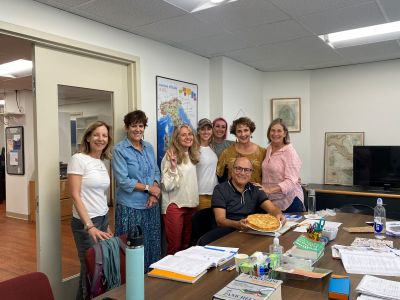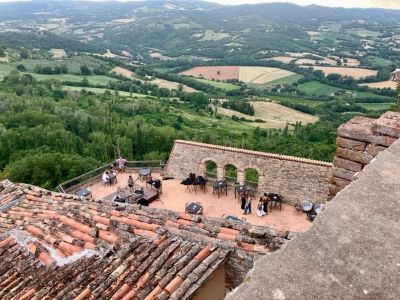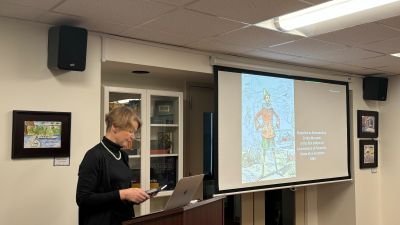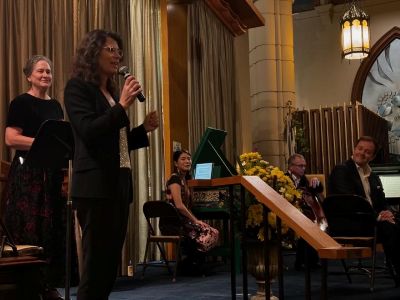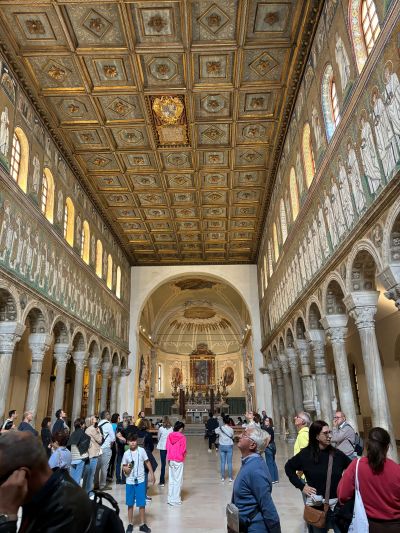Post-World War II, Italy was a nation in recovery, rebuilding its economy, infrastructure, and identity under new democratic leadership. In June 1947, the United States drafted the Marshall Plan, a program designed to provide financial assistance to Western European countries devastated by the war. As the third-largest recipient, Italy received 10% of that aid. In turn, U.S. government agencies, organizations, and business groups expanded their efforts to build strategic partnerships with their Italian counterparts. That collaboration led to the formation of civic organizations committed to cross-cultural and educational exchange among Italians and Italian Americans. And it paved the way for the 1956 launch of the America-Italy Society of Philadelphia (AIS-Phila).
Since its inception, AIS-Phila has embraced arts and education while continuing its commitment to the Italy-U.S. friendship. Meanwhile, in Italy, AIS-Phila has participated in restoration projects, such as the Committee to Rescue Italian Art in the aftermath of the 1966 Arno River flood, and built a center in 1980 for survivors of an earthquake east of Naples.
As the collaboration continues, AIS-Phila remains focused on deepening the understanding of contemporary Italian culture as it exists in Italy and moving beyond stereotypes. Chief among its offerings is a language school, offering 45 courses to around 350 students in person and online. The community can also participate in AIS-Phila lectures, films, concerts, and art exhibitions.
AIS-Phila Executive Director Elisa Schwab Clewis grew up in Brazil and Italy before moving to the U.S. She's lived in Philadelphia since 2006, working in the non-profit sector and gaining over 16 years of experience teaching Italian culture and language in higher education.
Elisa shared more about AIS-Phila, its unique offerings and mission, upcoming collaborations, and her leadership goals.
What new initiatives have you taken on as the organization's third director?
My mindset is that I will consider everything we get in. I never say no to anyone until I first talk with them.
It was maybe my fifth day here when we received this email from the Philadelphia Museum of Art inviting us to get tickets for the craft show in November, where Italy would be the guest country. I said, "This is interesting. We need to get deeper on this."
I found out who the artists were and decided to write a letter inviting them to a party here. They told me, "We cannot really talk to you directly. You need to talk with our curator. But he's actually amazing." So, I talked to him and began collaborating with him, and they came here. Some did not have enough money to stay in a hotel, so we arranged for them to stay with host families. And we had a welcoming dinner.
It was totally made up on the spot, but it went well. It was great.
AIS-Phila teacher Cristina Vea holds up a peace sign while posing with her language class.
Share more about your school.
The school seriously started about 11 years ago. The former director did an amazing job of building the basis of the school from one that had just a couple of courses. The board decided to bring in an executive director and a director of the school, and we are working together to take it to the next level. We are offering cultural courses, accelerated courses, and pronunciation courses. Our teachers are the heart of it. Several have PhDs in literature, one is a sociologist, and we have a film studies person. We have such expertise among our teachers.
Study abroad with AIS-Phila in Todi, Italy.
Tell us about your study abroad program.
We've been doing this for about 15 years, every June for one week in Todi, which is in Umbria. It is a very nice medieval town. Our students would take classes from 9 a.m. to 1 p.m., and then in the afternoon, we do sightseeing. The cool thing is that they can pick between homestays—a family home, a hotel, or an apartment. I will say that 70% of them want to stay in a home with a host family, which is great because you really get the best.
Anna Kraczyna spoke to AIS-Phila members about translating Pinocchio for Penguin Classics.
What events and activities do you offer, and what is their role in the mission?
The mission is to really bring Italian culture to the U.S. We are not a heritage organization, so we are a little bit different. Our events are getting deeper into aspects of Italian culture through history, art, music, and lectures.
We have been historically involved with the restoration of art in Venice. We do a series of conferences on Venice. It can be any aspect, like literature in Venice or the environmental situation of Venice, with the water rising. We just hosted Anna Kraczyna, the translator of Pinocchio into English for Penguin Classics. She presented the real meaning of the book, and it was absolutely wonderful. The event could also be seen on Zoom because some people are not in Philadelphia or have mobility problems. If you offer the event on Zoom, you open up to the entire U.S., so we will be looking into doing that more.
AIS-Phila's Amerita Chamber Players Concert Series
Can you share any memorable moments or success stories?
The November show with the artists was quite amazing. We ended up receiving art from three of them who decided to leave their art behind and donated it to us so that we can do an auction and a joint fundraiser. So I will try to sell it and pay them a fair amount. But then I can also do some fundraising with "100% Made in Italy" art pieces.
Success stories? There are a lot. We've been doing a lot of backstage work with the financial part of the organization. I was with an official at City Hall, welcoming high school students from the sister cities, one of them being Florence. The reception was wonderful.
It's such a rich job, yet so natural to me because that's what I am. I've always been between the two countries.
What upcoming projects or collaborations are you particularly excited about?
We are going to collaborate with Robert Campana, who has built Stop Italian Sounding. What is that? It's when someone approaches the supermarket in the United States and wants to buy a product. Often, products use Italian-sounding language, the colors of the flag, or the Tower of Pisa to show that the product is actually authentic, but it's not.
He wants to educate the public about this. He's been doing a terrific job to the point that when I was teaching at Arcadia University, I offered a course titled "Made in Italy," and part of my course focused on stopping Italian sounding. We went to his website and looked at his videos, and then my students had to build an advertisement to educate the public on that. So, Robert and I want to start offering master classes at AIS-Phila. Then, we'll have a tasting so you can also taste the product. We are looking into collaboration with restaurants or places where you buy Italian products.
We haven't really done much with food because I didn't want to fall into the "Let's cook together!" This Robert Campana collaboration is so perfectly in line with us; it's our way of, "Let's talk about food, but let's talk about it in an educational way. Let's give you some options so you can decide." For me, it's a great accomplishment that we will collaborate.
Philadelphia has the World Affairs Council of Philadelphia, the oldest nonprofit that deals with the international environment in Philadelphia, and we are officially collaborating. We are already organizing the welcoming event for the new general consul from Italy, who is coming this summer. We want to do an official welcome between us and them.
We are also collaborating with an organization that helps people get Italian citizenship. Especially now, we get a lot of requests. We absolutely do not give any legal advice. So, I decided to collaborate with an organization called Italiza. They're based in New Jersey, but they work with the entire U.S., and their legal office is in Rome, so they can really help people with that. We help people with translations.
AIS-Phila presents Vittorini awards to University of Pennsylvania students who study abroad and encounter sights such as Ravenna's Basilica of Sant'Apollinare Nuovo.
How do you hope to impact the community?
Sometimes, the understanding of Italy is very romantic. It's very, "Wonderful wine!" and "Bella Vita!" My underlying mission is to really bring Italy and the understanding of the complexity of a country with a huge culture, history, and diversity. So, I am just really going beyond what people might superficially think and trying to really educate the public. And sometimes, Italian Americans are the ones who need to move away from their stereotypical idea of Italy and move to "This is a country that lives today. Things didn't stop 60 years ago."
We have 20 teachers, including the director of the school. We are from Italy, so that's what we are, right? That's what I like to promote.
I hope to share the complexity of Italy and the reality of today. I'm happy some of our students want to travel to Italy. The fact is that most tourist places don't really represent the country, so really, it's all about this authenticity.
If you enjoyed this article, consider subscribing to my newsletter for more content and updates!

